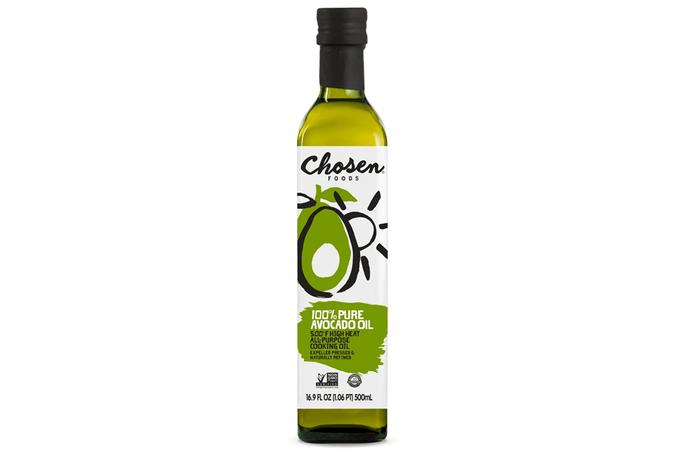Technically a fruit but often considered a vegetable and a healthy fat, avocados are one of nature’s natural wonders. There’s lots to embrace about the super fruit.Not only are they a good source of cholesterol-helping fibre, but “just one-third of a medium avocado contributes nearly 20 vitamins and mineralsmaking it a healthy, nutrient-dense choice,” says Marisa Moore, an Atlanta-based registered dietitian nutritionist and spokesperson for Love One Today, a site that provides nutrition information about avocados. “The unsaturated fat in avocados can act as a nutrient booster by helping to increase the absorption of fat-soluble vitamins A, D, K, and E.”You get all that for just 80 calories. And unlike many fruits and even veggies that contain sugar, this green gem has almost none at all. Plus, avocados are deliciousas a salad topper, in deviled eggs, and as the star of avocado toast. And they’re incredibly versatile in recipes. You can puree them into gluten-free brownies(yes, really) or blend them into a vegan smoothie.That’s not all. Avocado oil is becoming increasingly popular as an alternative to olive oil, canola oil, and other cooking and finishing oils.Here’s what you need to know about avocado oil benefits and how to add it to your diet.(Related: Canola Oil vs. Vegetable Oil: Which is Healthier?)
How is avocado oil made?
The avocado has long been known for its high oil contentso much so that its nickname is “vegetable butter” and “butter pear,” according to The American Oil Chemists’ Society. One avocado can boast up to 30 percent oil.So how is this oil extracted from the fruit? Cold-press extraction is done through a mechanical processmuch the same way olive oil is extracted. After the avocado seed and skin are removed, the avocado flesh is ground to a paste. Then it’s slowly churned for up to an hour at 115 to 122 degrees F. The avocado oil goes through a couple of separation steps, and then the process is complete.A tablespoon of avocado oil contains 124 calories, 10 grams monounsaturated fat, 2 grams polyunsaturated fat, and 2 grams saturated fat. A plus: Cold-pressed avocado oil features the flavour of the fresh fruit. This is because it’s unrefined.
Varieties of avocado oil
You’ll find many varieties of avocado oil out there. Extra-virgin avocado oil is produced from high-quality fruit, extracted via mechanical methods with a temperature below 122 degrees F and with no chemical solvents. Virgin avocado oil has the same guidelines, but is made from a lower-quality fruit, according to a study published in 2019 in Molecules.Then there’s pure avocado oil, which is bleached and deodorized and infused with natural fruit or herb flavour. Finally, and last on the totem pole, you’ll find mixed avocado oiltypically combined with olive, macadamia, and other types of oil.
Buying avocado oil
Be careful that you buy from a brand you trust. “A recent study found that a huge percentage82 percentof avocado oil on the market is fake,” says Kelli Shallal, a registered dietitian and author of Meal Prep for Weight Loss.Shallal advises her clients to buy Chosen Foods, Primal Kitchen, or Thrive Market avocado oil.A study, published in 2020 in Food Control, suggests that the majority of avocado oil sold in the United States is poor quality, mislabeled, or mixed with other oils. The latter is okay, of course, if the bottle is properly labeled. But the study’s researchers found that many oils were mostly soybean oil, even though they were labeled “avocado oil.” What’s more, they were rancid before expiration.One of our favourite avocado oils is Chosen Foods Avocado Oil 100% Pure, ($7).(Related: The 10 Healthiest Cooking Oils, According to Experts)
Avocado oil benefits
“Avocado oil is extremely healthy because it contains high amounts of monounsaturated and polyunsaturated fats,” says Megan Byrd, a registered dietitian in Tangent, Oregon. “It also contains a ton of vitamin E and antioxidants.”And the same heart-healthy benefits that apply to the avocados extend to avocado oil. “It contains a large amount of oleic acid, a monounsaturated fat known to have anti-inflammatory benefits,” says Byrd. “Monounsaturated fats like those found in avocado oil can help reduce LDL ‘bad’ cholesterol and help increase HDL ‘good’ cholesterol.”The perks don’t stop there. Avocado oil may be helpful for people with type 2 diabetes. “Avocado oil may be beneficial for blood sugar control,” says Byrd. “It potentially increases insulin sensitivity in people who have type 2 diabetes. An increase in insulin sensitivity means lower blood sugar.”
How should you use avocado oil?
One of the perks of avocado oil is its neutral flavour. “If you are looking for an oil with almost the same health benefits without the strong olive oil flavour, it can be a great choice,” says Shallal.Another benefit? Avocado oil has a high smoke point of up to about 520 degrees F, meaning it can be utilized for high-heat cooking like searing, sauting, and baking. This is a much higher smoke point than that of olive oil.”The smoke point of an oil is the temperature at which the oil begins to smokeor burn and become rancid,” says Shallal. “The higher the smoke point, the higher heat you can use to cook with.”Avocado oil performs incredibly well when pan-sauteing ingredients for fruit tacos, when baking a cake from scratch, and in a homemade salad dressing. Byrd enjoys using avocado oil as a finishing oil, drizzled over vegetables.
The takeaway
Avocado oil is an excellent source of nutrients. The healthy fat boasts several health benefits, ranging from protecting heart health to promoting blood sugar control. And it’s a versatile healthy cooking oil in the kitchen.(Next: What Happens When You Eat Avocado Every Day)
The post Is Avocado Oil Healthy? What Nutritionists Need You to Know appeared first on Best Health Magazine Canada.


0 Commentaires